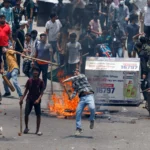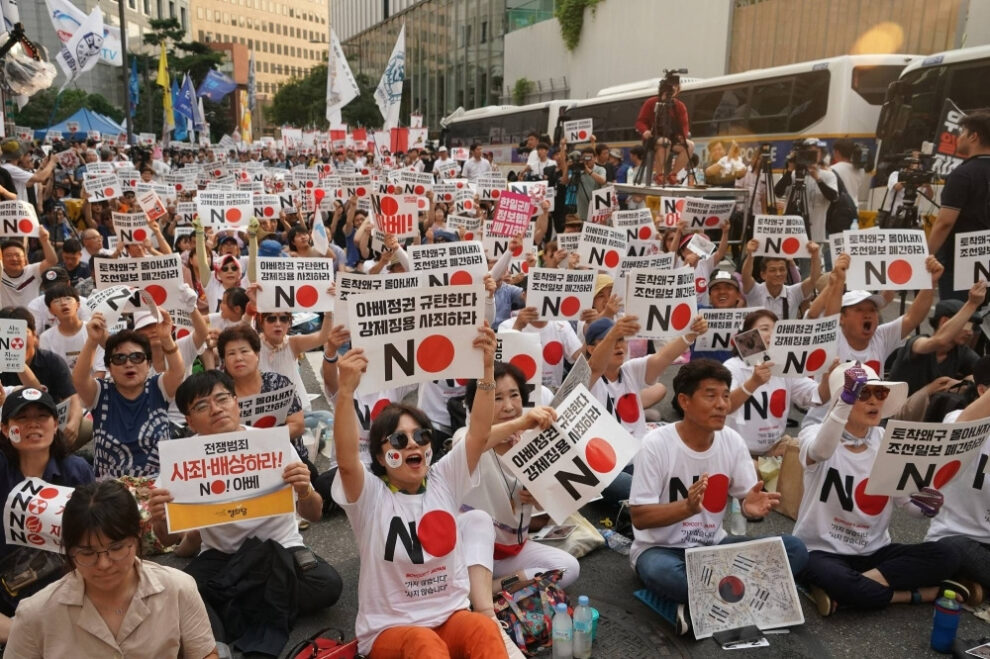A recent rally in Seoul, South Korea, carried the sound of a rock festival — high-amp speakers throbbing with the K-pop hit “Gangnam Style” — if not the look of one. The crowd of mostly elderly people waved South Korean and American flags to the song’s revised refrain: “Anti-communist style!” When speaker after speaker revved up the crowd with pro-American, anti-communist chants, the crowd shouted, “Hooray for President Yoon Suk Yeol!”
Days later, when thousands of mostly younger protesters marched through the same city center, they shook handheld signs and chanted, “Out with Yoon Suk Yeol!”
Park Yeol, a regular at such rallies, showed up as an inflatable caricature of the South Korean leader. Fellow protesters took selfies while putting him in a headlock.
“Some people try to punch me,” said Park, 50. “But that’s the point: I want to demonstrate how mad people are at Yoon.”
Protest rallies have been a fixture of this capital city of Asia’s most vibrant democracy for decades, born during South Korea’s difficult march toward democracy in the 1980s when massive crowds, often armed with rocks, firebombs and even stolen rifles, clashed with riot police, tanks and paratroopers. Distrustful of their government, South Koreans have a penchant for taking all manner of grievances to the streets, so much so that it has turned demonstrating into a kind of national pastime.
As the coronavirus pandemic has receded, protest rallies have returned to Seoul with a vengeance. Barely a weekend passes without the city center turning into a raucous bazaar ringing with livestreamed protest songs, slogans and speeches that reveal a country increasingly polarized over its president.
The vast majority of protests now are organized by rival political activists who use social media, especially YouTube, to mobilize supporters and livestream their gatherings. With churchgoers and other elderly citizens on the right, and mostly younger progressives on the left, they have become a public referendum on Yoon and his policies.
Leftwing protesters call Yoon a “national traitor” and demand his impeachment, holding him accountable for policies they see as anti-feminist and anti-journalist; for the crowd crush last fall that killed 159 people; and for his attempt to improve ties with Tokyo, Korea’s historical enemy, despite Japan’s release of treated radioactive water from its Fukushima nuclear power plant.
But Yoon has found a sorely needed ally in rightwing, mostly Christian and elderly South Koreans who rally to defend him and the country from “pro-North Korean communists.” That is a Cold War-era moniker that still packs a punch in a country that remains technically at war with North Korea and still enforces a draconian anti-communist “national security act.”
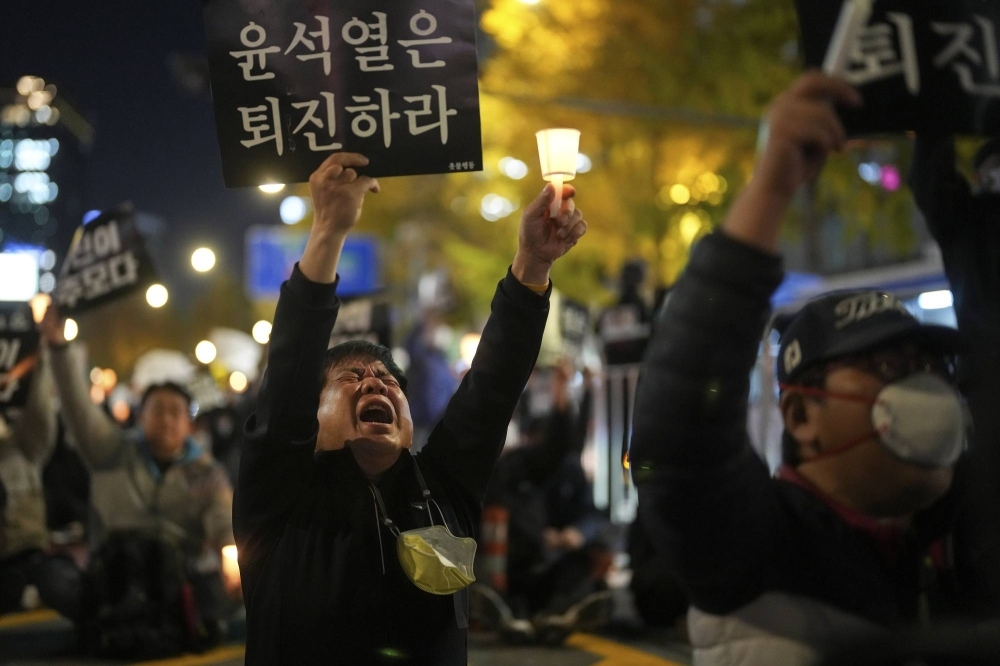
A typical demonstration features colorful banners and dance troupes romping on a temporary platform as concert speakers dangling from crane trucks blare protest songs. Organizers lead the crowd in chanting slogans, pumping their fists in unison or waving national flags. Peddlers weave through the throng hawking rain cover in summer and plastic cushions in winter. The hourslong rally usually ends with a march. Police officers walk alongside the demonstrations to keep order.
Most of the rallies don’t make national news. But when they grow in size and intensity, they can herald a political storm ahead.
Massive protests spearheaded by progressives in 2017 triggered the impeachment of Park Geun-hye, who was then the country’s conservative president. Monthslong protests led by Christian evangelicals galvanized a conservative pushback against Park’s progressive successor, Moon Jae-in, and helped Yoon win election as a conservative candidate in 2022.
“We cannot hand over our country to North Korea,” said the Rev. Jun Kwang-hoon, the organizer of the largest conservative rallies, during an interview at his Sarang Jeil Presbyterian Church in Seoul. “We church people cannot sit still.”
Until Jun began mobilizing large conservative rallies several years ago, the outdoor protest scene had been dominated for decades mostly by students and unionized workers who waged often violent campaigns against dictatorship, corruption and inequality. But in this rapidly aging society, the votes of older people wield more power than ever, and conservative churches have the resources to channel their hostility toward North Korea and South Korean progressives who favor inter-Korean reconciliation into a nationwide political movement.
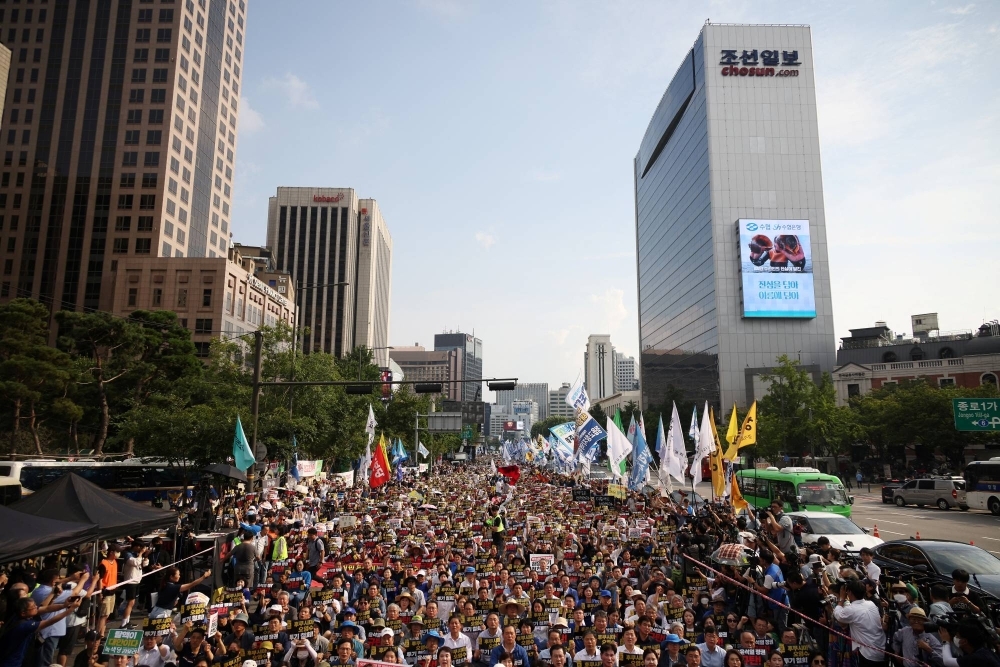
In sermons and speeches, Jun has repeatedly warned that if progressives take power, South Korea will be ”communized” by North Korea, and China will replace the United States as its main ally. If that happens, he says, there will be “10 million South Koreans massacred” and “another 10 million fleeing to the sea as boat people.”
“I know all this because the Lord told me,” he said during a rally in August, calling himself a “prophet.”
Protest rallies in South Korea share elements of the populism sweeping much of the world. Both right— and leftwing activists accuse traditional news media of spreading fake news and political bias. They rely on social media platforms like YouTube for alternative news sources, using them to spread fears that South Korea is being dominated by a deep state (of corrupt conservatives or pro-North Korean progressives, depending on which YouTube channel one listens to).
Livestreaming protest rallies has become a staple for partisan YouTube channels. Jun uses such channels to propagate his viral narratives and draw older people to his rallies. “We must fight through YouTube,” Jun said during a large indoor gathering of followers, calling them “YouTube patriots.”
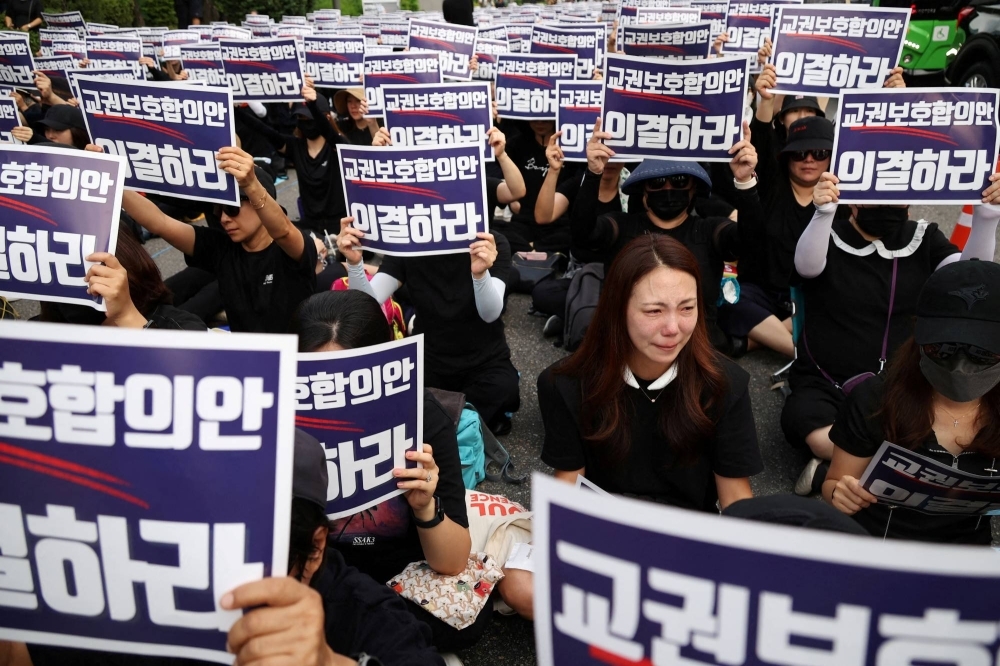
In this social media-obsessed, factionalized country, conservative influencers like Jun have become so powerful that they helped “radicalize” Yoon’s government, Ahn Jin-geol, a longtime progressive activist, said in an interview.
In recent months, Yoon has delineated the political divide more bluntly than ever. In a nationally televised speech on Aug. 15, he attacked “anti-state forces” who blindly followed “communist totalitarianism” and “always disguised themselves as democracy activists, human rights advocates or progressive activists while engaging in despicable and unethical tactics and false propaganda.”
His remarks were replayed to wild cheers during a conservative rally on the same day.
Lee Jae-myung, the leader of the main opposition Democratic Party, has accused Yoon of depending on “flag-wavers and rightwing YouTube extremists” to sow political polarization. Lee went on a 24-day hunger strike last month to double down on his claim that Yoon is splitting the country into friends and foes.
Progressives rally crowds with a litany of complaints about Yoon’s government, ranging from inflation (“Everything has increased, except for our wages!”) to the allegation that Yoon, a former prosecutor general, has used criminal investigations by prosecutors to disgrace his enemies, including unfriendly news media (“Dictatorship by prosecutors!”).
“Yoon Suk Yeol is nuclear wastewater himself!” read another protest slogan, criticizing his government’s acceptance of Japan’s release of Fukushima water.
“From history, we know we can make a decisive change when we join forces out on the streets,” said Lim Jae-kyong, 30, a progressive protester.
Progressives’ rallies often employ pageantry, reflecting a celebration of the democracy they won from a past military dictatorship. Singers satirize government policies. Young activists stage song-and-dance performances depicting Yoon as a clueless drunkard. Families often attend the rallies with children. Some dance while marching.
“Are you ready to have fun?” Ku Bon-ki, a progressive activist, shouted to the crowd during a recent livestreamed rally. “Are you ready to fight?”
Conservative rallies are part political, part Christian revival meeting in appearance. As speakers attack prominent progressives — including Lee of the Democratic Party — with expletive-laden diatribes, labeling them “North Korean spies,” many in the crowd raise their arms and shout “Amen!” or “Hallelujah!”
But conservatives also energize their gatherings with patriotic songs and pop standards catering to old people, like “What’s Wrong With My Age?” The song’s refrain — “It’s a great age to fall in love” — is changed to “It’s a great age to become a patriot.”
Jeong Sook-hee, 54, a day care center worker who recently attended a conservative rally in central Seoul, called the experience “like going to a baseball park,” a reference to South Korea’s boisterous ballgames.
“You sing, dance and shout to your heart’s content,” she said. “You relieve stress from the daily grind.”
Source : TheJapanTimes






